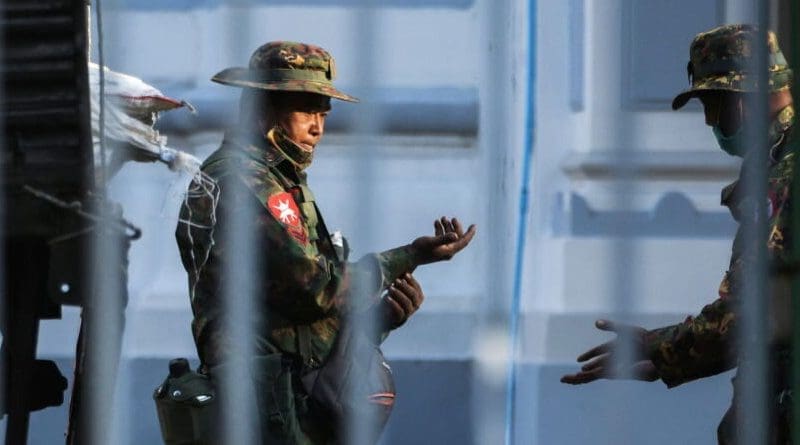The End Of The AA-Junta Armistice: Will The Rohingya Repatriation Begin? – OpEd
On November 22, 2023, the Foreign Secretary of Bangladesh Masud Bin Momen said preparation to commence sustainable and voluntary repatriation of the Rohingyas to their homeland would be continued. This statement is significant in the time when the Arakan Army has launched a fresh offensive in Rakhine State, breaking a year-long informal ceasefire with the Junta-a part of the Operation 1027 against the military junta of the country that seized power in February 2021. This has further complicated Rohingya repatriation that has been hanging in air for the last 6 years. The situation in Rakhine was already in question for Rohingya’s return but now that violence has resumed in the region in full force, it seems there is no solution to their statelessness in near future.
Operation 1027, launched on October 27th by the Three Brotherhood Alliance, comprising the Myanmar National Democratic Alliance Army, Ta’ang National Liberation Army, and Arakan Army targeted Shan, Kachin and Chin states, captured towns, severed trade routes to China, and overwhelmed military outposts. Sensing the junta’s vulnerability, other armed groups such as the Kachin Independence Organisation (KIO) and resistance forces in Kayah State have also joined the fray, threatening to stretch the military’s capacity thin.
The Arakan Army (AA), one of Myanmar’s most audacious and effective insurgencies, has been fighting the junta for more than a decade now. Since the de facto ceasefire between the Arakan Army (AA) and the military in November 2022, the area had experienced relative stability. The truce promised to ease travel restrictions in Rakhine and lift the blockade on Sittwe, the vital business and transport hub. AA asserted its observance of an informal ceasefire for humanitarian reasons as civilians were suffering the most due to the constant fighting and emergency in the region.
However, the AA’s involvement in the current operation raises questions about the junta’s response within Rakhine as the group has exhausted Myanmar’s military forces even in peace times. Myanmar military and police has already evacuated nearly 40 positions in Rakhine State along with many troops surrendering to AA. AA fighters are also battling the junta across northern Shan state as part of Operation 1027.
Myanmar’s generals are definitely facing their biggest test since taking power in a 2021 coup. This is now a fact that the growing cracks in the military’s grip on power is now greater than ever. Although Myanmar’s current political instability has surely been a cause of the delay of Rohingya repatriation but operation 1027 might actually put an indefinite full stop on it. The Arakan Army resuming hostilities in Rakhine State has grappled the regime with conflicts on multiple fronts. The regime has now found another excuse to delay Rohingya people’s homecoming.
The Buddhist Arakan Army is not also kind to Rohingyas as the group has been carrying out atrocities against Muslims in the region since its establishment in 2009 which has continued even after the coup. So, what can be predicted for Rohingya future in the country?
Dhaka and Naypiydaw were in talks for the repatriation of 3,000 Rohingyas by December this year. Myanmar officials visit to Bangladesh just before the alliance’s attack confirmed this- a part of a pilot repatriation scheme discussed in a three-way meeting between the two countries and China in April. This came after Myanmar juntas dillydallying of 5 years.
Bangladesh did everything possible to keep the Rohingya repatriation issue relevant-pursuing discussions on the issue in different bilateral and multilateral platforms. So, its only fair that the Bangladeshi government are not letting this opportunity go, continuing repatriation preparation. Repatriation remains the most viable solution to this crisis and even the Rohingya long to return to their homeland.
Since the coup, the Arakan Army has been controlling two-third of the Rakhine state and frequently clashed with the Myanmar army. Myanmar army planned to take back the Rohingyas to their own villages in North Maungdaw and nearby places instead of any camps or model villages, which Myanmar had proposed earlier. So, if AA manages to gain control of the whole Rakhine state while junta is busy fighting everyone, everywhere-who will authorize Rohingya return?
The only relief in this situation might be China’s alleged influence on the brotherhood which might ensure Rohingya repatriation no matter who runs the Rakhine state. However, the resumed fighting might change the minds of refugee Rohingyas who voluntarily wanted to repatriate.
Another possibility that looms is that this might be the beginning of end of the Junta regime in Myanmar. The revolution of the people of Myanmar against the illegitimate ruler of the country has been boosted by participation of the three-brotherhood alliance which might bring a decisive end to the ongoing hostility all over the country. In that case, the potential acquisition of NUG as the Myanmar government presents a promising prospect for the realization of their pledge to uphold the rights of the Rohingyas.
All these are certain and uncertain possibilities that will unfold on their own as the time passes. The impossible situation of repatriation has today become a possibility which should not be let go easily by the parties. While repatriation is the necessary solution to this crisis for all the parties involved but it can’t be denied that repatriation in a democratic Myanmar is the best solution for Rohingya.
So, the world must not forget the pain of Rohingya and the struggle of Myanmar against its oppressor. Only then it might be guaranteed that Rohingya tragedy won’t be repeated again.

